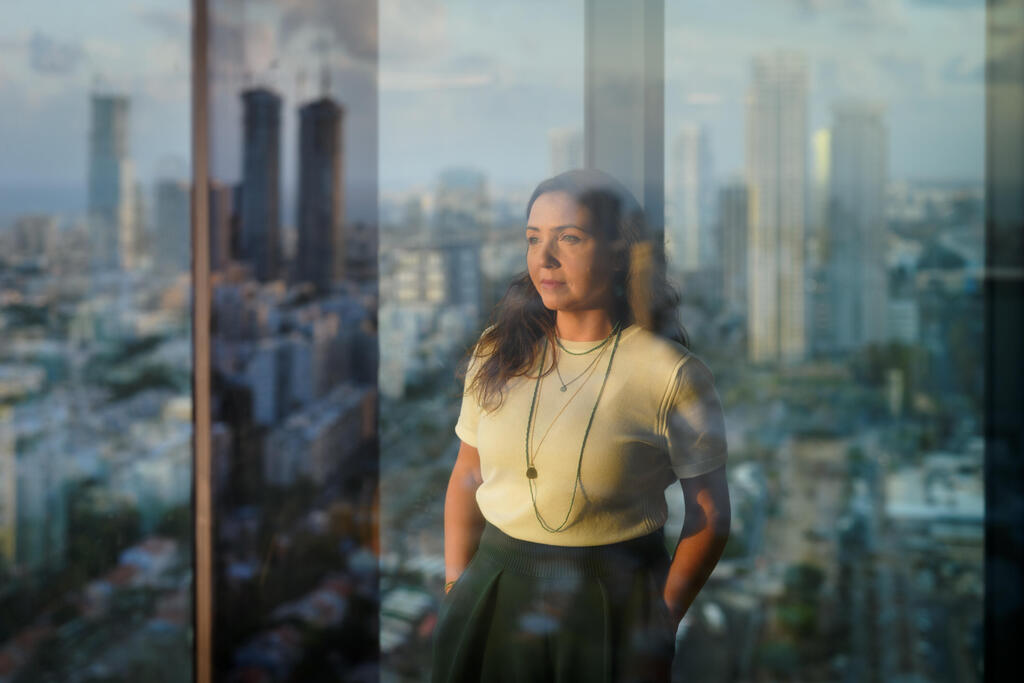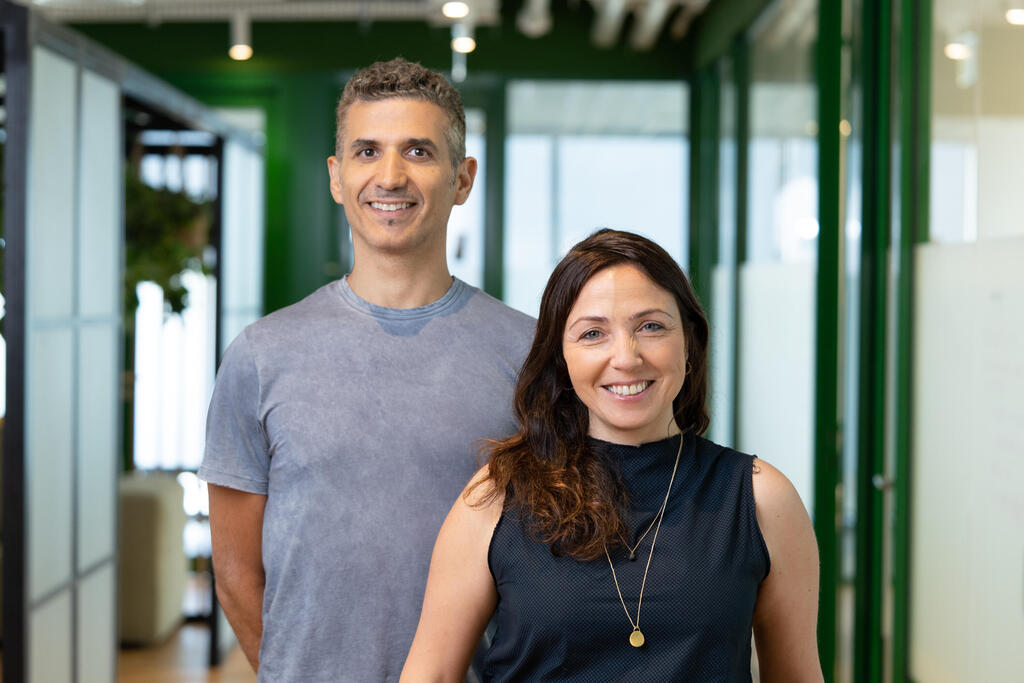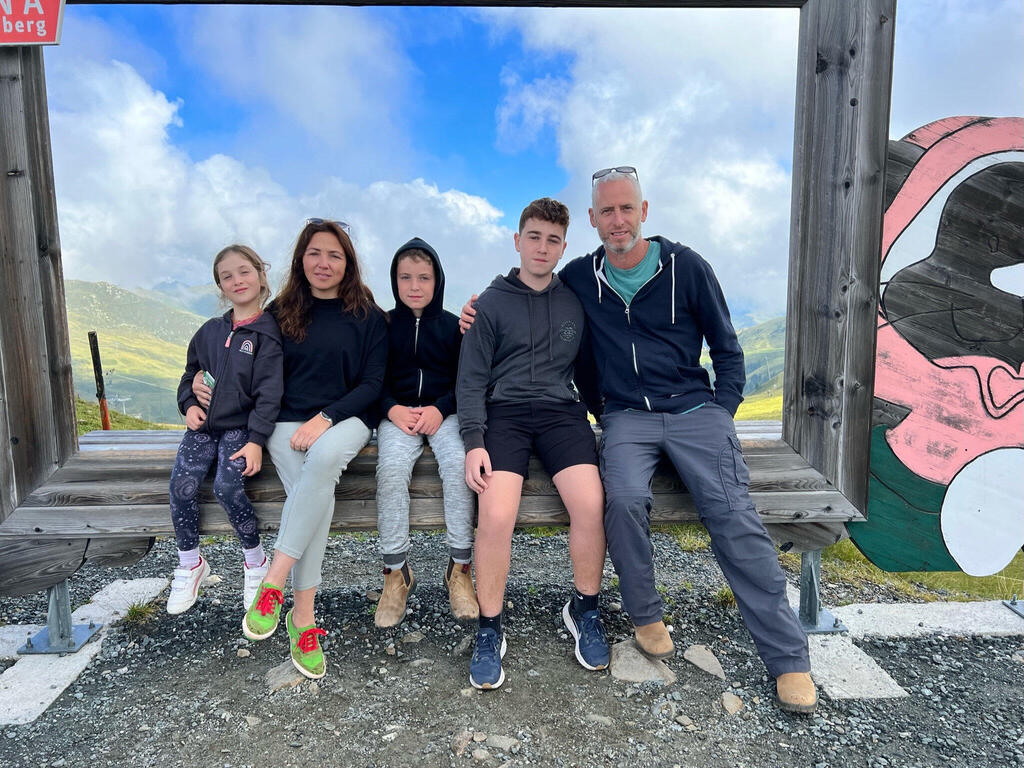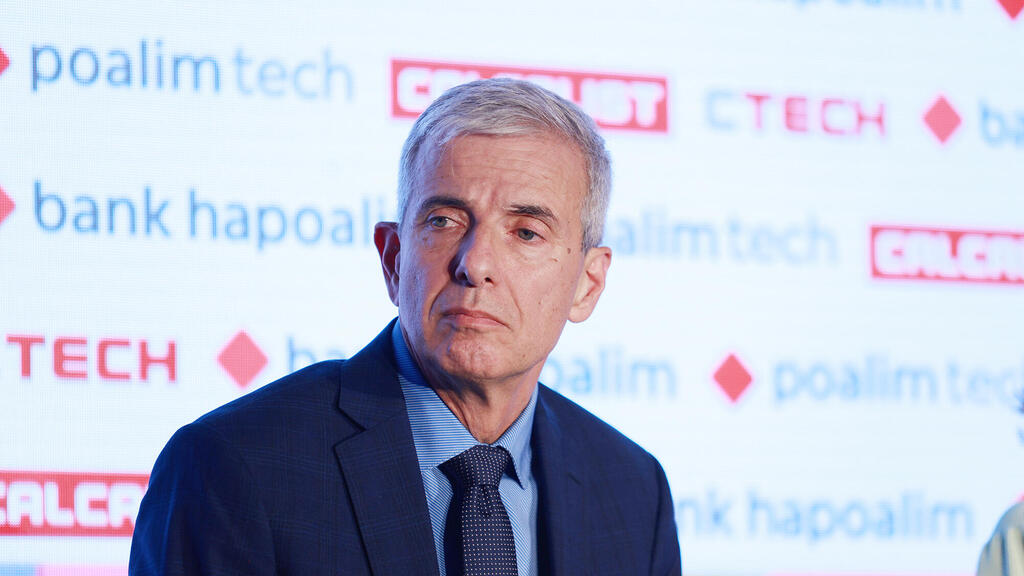
How Lior Wilczynski turned her immigrant roots into a $150 million fintech exit
The acquisition of Morning, the company behind Green Invoice, by TeamSystem marks a personal and professional triumph for Wilczynski, whose journey defies the odds.
Lior Wilczynski’s early circumstances didn’t seem likely to produce an entrepreneur who would build a company from scratch, dominate the Israeli market, and eventually sell it for $150 million while still holding 30% of the shares.
Or perhaps the opposite is true. Maybe it was precisely the challenges faced by Wilczynski—immigrating to Israel as a 13-year-old girl from Belarus in 1990, accompanied by her seven-year-old brother and parents, without knowing Hebrew, lacking possessions, and arriving with “just some furniture and a piano”—that fueled her drive to succeed.
When she describes her first years in Israel, there’s no bitterness, only sober reflection—what she calls a "Russian" perspective. "My parents gambled their lives when they came here," Wilczynski recalls. "They left as soon as the borders of the former Soviet Union opened, packed up me and my little brother, and immigrated to Israel. My mother, Irina, was an art teacher, and my father, Vladimir, was a piano teacher. But you can’t make a living from that in Israel, especially without knowing the language."
And what about you?
"I was the Russian girl who arrived in Ganei Tikva, the first immigrant in the school that everyone stared at. Soon after, as immigration increased, the racism grew stronger. I saw how they looked at me, what they said about me, the stereotypes they had about the 'foreign' girl they all called 'Russian.' I didn’t understand why they called me that—after all, in Russia, they called me Jewish. It felt like an insult, and I realized I had to hide who I was. In ninth grade, I transferred to Thelma Yellin High School, a Jewish-Russian girl who had been studying piano her whole life."
What name did you use when you immigrated to Israel?
"Lena. I became Lior."
What else did you do to hide your origins?
"I stopped speaking Russian to my parents. I wouldn’t answer them in Russian. My friends were only Israelis. I was ashamed for many years and hid my background. When people asked if I was Russian, I’d respond, ‘What the hell, I’m a Sabra,’ with a thick Russian accent," she laughs. "In adolescence, you’re trying to find yourself, you don’t know who you are, and there was this internal conflict. It wasn’t fun. I put on very thick armor and hid. It took me years to find my true voice and start talking about my absorption experience and how it shaped my identity. Only in recent years have I begun to share this."
Why only recently?
"Because I feel more secure in who I am. And I realized it’s okay."
Your parents also faced challenges with immigration and a not great financial situation.
"What do you mean by 'not great'? They had nothing. My father, who had been a piano teacher at an academy, worked in the logistics unit at Mizrahi Bank and stayed there until he retired. He adjusted, but let’s just say—it had no soul. My mother did every job she could until she learned Hebrew and began teaching at a school. We were all just surviving, each of us focused on our own survival.
"A year after we arrived, my parents divorced. Our family fell apart before we even found our footing in the new country, and my brother and I moved with my mother to Rishon Lezion. The apartment there had no furniture, and there was no money for any. My mother spread a blanket on the floor for me to sleep on instead of a mattress or bed. By tenth grade, I left Thelma Yellin, stopped playing piano, and for the third time, started at a new school with new kids."
That sounds tough.
"It was tough, but look what came out of it," she smiles. "It didn’t last long, but that’s how we began. My mom worked every possible job outside of school to supplement her income, including cleaning stairwells. She’s a fighter. My dad worked nights and slept during the day—that was his livelihood. When he got a job at the bank, he settled into a routine, but there was never any extra money at home. I don’t remember feeling deprived, maybe because I didn’t know what I could want in the first place. Luxuries weren’t even on my radar. The first time I flew abroad with my mom and her new partner, when I was 16, we packed instant noodles and boiled water with an electric coil so we wouldn’t spend money on food—only on museums. And very quickly, I began supporting myself."
What does that mean?
"I started working at the age of 16 because I didn’t feel I could ask my parents for money to buy things. My first job was at Burger Ranch, and then I waited tables at a bar in Rishon Lezion. I paid for my own driving lessons, and the first car I bought, which was older than me, was purchased with my own money. I think that’s when my desire to be independent and take responsibility for myself truly began. I didn’t want to depend on anyone. I wanted to be in a position where, if I wanted something, I could get it myself."
And your studies?
"There were conflicts when I had to balance studying for my matriculation exams while working shifts. But I didn’t let it interfere."
Meaning?
"I studied. A Russian girl has to study for the matriculation exams. It’s a big deal at home—first studies, then everything else."
In the army, you served as a liaison officer, not in the technology units.
"Who even knew what Unit 8200 was back then? I had no idea. After the army, when I decided to improve my matriculation scores, I took 5 units in math, scored close to 100, and realized I had a talent for logical thinking. That realization, combined with my drive to be independent, led me to study computer science. I graduated just as the dot-com boom was taking off. But because I couldn’t find a job in the field, I started a sushi business, making and selling sushi for small events in high-tech offices. It wasn’t what I dreamed of doing, but it was my first taste of entrepreneurship. Eventually, I found a job in high-tech."
What’s your connection to Green Invoice?
After her sushi venture, Wilczynski (48) finally entered the tech industry, working at Dotomi, a startup founded by Yair Goldfinger, one of ICQ’s co-founders. Dotomi was later sold for about $300 million. At Dotomi, she met Rami Gabai, who would later co-found Green Invoice with her. "Rami and I studied computer science together and were very good friends. Through him, I met his friend Gabi, who later became my husband," she says.
From there, Wilczynski moved to Motorola. "I worked in 'corporate' and realized what I didn’t want to do with my life—to be a small cog in a large system. When I left Motorola, I decided I wouldn’t work as an employee anymore. I wanted to be independent, control my time, and work from wherever and whenever I wanted. I’m flexible and get along with people, but I don’t like having decisions made for me. I prefer holding the reins and applying my common sense to the realities around me."
What was the trigger for starting Green Invoice?
"It started with something really small. In 2011, Rami and I were working as freelancers. He told me, ‘Every time I issue a payment request, I have to fill in all the details, and then, after I get paid, I have to issue a tax invoice and fill in the details again. Why isn’t there something as simple as autofill?’ That little annoyance, that unnecessary pain, was the seed that led to starting the company."
Was it just about autofill invoices?
"As we developed the product, we discovered more pain points for the self-employed. Most freelancers start businesses because they’re great at their craft—whether as photographers, developers, designers, or doctors—but they’re not financial managers. They don’t understand accounting language or how to manage their business. They don’t know how to analyze a trial balance, handle expenses, or deal with the tax authority. We created a user-friendly interface that gave people confidence. They could leave our platform thinking, ‘This isn’t so bad—I can manage my business.’"
How do you make accounting “pleasant”?
"One example is expense management, which used to be a mystery. People would collect receipts from gas stations, taxis, and hardware stores, stuff them into a bag, and visit their accountant every couple of months to report expenses. Today, with our app, you just take a photo of the invoice. The system extracts all the data, records the expense, categorizes it, and associates it with the right supplier, amount, VAT, and expense type. That’s it. It’s seamless.
"Proper business management requires claiming VAT on expenses, but people didn’t do it because the process was tedious. Once it became simple, they started doing it regularly.
"Of course, we’ve evolved a lot since then. We’re now integrated with all banks and credit card systems, so users can connect their accounts and view income and expenses in real-time. We’ve also built an open platform for accountants and banking. We even launched a new product for financing and invoice advance payments in collaboration with Greenland, which is embedded in our system."
I must say, as a high-tech company, choosing to work in the field of invoices sounds dull. What interested you about it?
"Accounting isn’t the main focus. Our mission is to improve the lives of freelancers, and there’s plenty of room for creativity here. Invoices are just one product within a burdensome process that must be done, but our goal is to look at the whole picture—how to help freelancers focus on their business and fulfill their potential. When you frame it that way, it’s not dull at all."
Why did you choose the name Green Invoice?
"Partly because it was ecological—a digital invoice instead of paper—and partly to emphasize convenience for users, who no longer need physical invoice books. We even had a calculator that showed how many trees were saved thanks to using digital invoices."
How much technology is behind the product?
"We are a product company powered by technology, but the tech is simply a tool to create easy, intuitive usability. We’re a classic SaaS (Software as a Service) company, offering subscription plans ranging from NIS 29 to NIS 75 per month, depending on the features and scale needed. There’s no patent; our innovation lies mainly in the concept. Others have addressed the challenges faced by freelancers, but not in the same way we have. It’s important to us that users feel something towards our system."
Feel something towards invoices?
"Exactly. What emotions could you possibly have towards invoices, right? But there’s a sense of empowerment that comes with managing your business and handling things on your own. That’s why most of our customer service is provided through written correspondence in an informal, accessible tone. I even conduct training on this because many users don’t know what to ask.
"We’ve built a community on Facebook and even launched a magazine with content tailored for small businesses. If someone doesn’t remember what system they’re using, they’re not with us. People who use Green Invoice remember."
"Then came the coronavirus boom"
Ten days ago, the company that set out to "make invoices fun" was sold to Italian fintech giant TeamSystem for $150 million. Wilczynski and Gabai, who serves as CTO, managed Green Invoice for a decade without outside investors, operating as a bootstrap startup—a profitable company capable of funding itself. The only external investment came in 2021 when Fortissimo invested $20 million, valuing the company at $50 million.
As a result, although the exit wasn’t astronomical by startup standards, the two founders reached it while still holding unusually high stakes—around 30% each (Fortissimo holds 40%). "It’s almost at those numbers," Wilczynski clarifies. "There’s another 6% divided among the employees."
What makes you and Rami such a successful business team after 13 years?
"Rami is called 'the hawk' by our team. He can instantly spot a solution to a technical problem that others might take days to figure out. I’m more balanced, focused on harmony. It’s important to me that everyone in a meeting feels heard. Rami, on the other hand, is sharp and decisive—he can get bored in meetings and prefers to cut straight to the point. We complement each other perfectly."
How did you decide who would be the CEO?
"It was a natural choice. Rami is a technology genius, so we decided he would focus on technology, which is our core. I took on everything else. Over time, the scope of 'everything else' grew, but we’ve always stayed in our lanes, playing to our strengths."
When did the first big leap happen?
"In 2017. At that point, we had 10 employees and 20,000 users. Rami and I were sitting in a room in the science park in Rehovot, talking about the company. We realized we had something good and could continue growing slowly, but then we had this moment where we said, ‘Let’s go for it.’ It was a turning point. Life circumstances played a role too—our kids were older, and we had the flexibility to dedicate ourselves to the company full-time. We decided to move to Tel Aviv, the heart of Israeli high-tech."
What changed when you moved to Tel Aviv?
"We joined the Labs complex in Azrieli Sarona, on the 59th floor. Looking out over the city gave us a new perspective. It whetted our appetite and energized us. Surrounded by startups, it felt like everything was possible. We started with a small office for six people, and three and a half years later, we were occupying half a floor."
How did that happen?
"In 2020, the coronavirus hit. At first, we were worried it would destroy everything we had built, but it ended up being one of the best things that happened. Everything exploded—in a good way. Companies laid off employees, work structures shifted, and many people decided to follow their dreams of becoming freelancers.
"During the pandemic, we experienced massive growth. By the end of 2020, we had 70,000 users. Suddenly, we were on everyone’s radar, and investment offers started coming in."
It’s the moment every entrepreneur dreams of.
"But the dynamic between Rami and me was strong, and we were wary of bringing in another party that might disrupt it. Then the Fortissimo fund came along. We were experiencing significant growth, and I said to Rami, 'Let’s take this to the next level.' We had a strong connection with Yuval (Cohen) and Uri (Zehavi) from Fortissimo, and for me, building personal connections is critical. They invested in us in early 2021, even though we didn’t really need the money because we were a small but profitable company—a rare breed in the startup ecosystem, especially at that time."
What do you mean?
"Back then, the trend was all about crazy growth without much concern for profitability, with the hope that the numbers would eventually work out. The venture capital funds were partly responsible, as they demanded significant year-over-year growth, which could only be achieved by massive investments and hiring many employees—who, of course, needed to be paid. This approach has shifted since the bubble burst two years ago."
Did Fortissimo also push you to grow quickly?
"Fortissimo wanted growth, but they helped us do it sustainably, building a strong, profitable organization. They guided us in developing robust management, hiring the right people, and creating a forward-looking budget. We decided to focus on growth for three years, aiming to emerge as a much larger company afterward. We moved to the Midtown Tower in Tel Aviv, took an entire floor for our offices, and recruited people who wanted to make an impact, not just fill a job.
"When Fortissimo joined, we had 50 employees. Today, we have 100. Our user base grew from 70,000 to 150,000. There’s a big difference between managing a company with 50 employees and one with 100."
When Fortissimo invested, did you already see an exit on the horizon?
"We hadn’t thought about it at the time. We were focused on building a large, stable, and growing company, one that would eventually return to profitability."
There are strong startups in this field operating in major markets outside Israel.
"Yes, like HoneyBook, founded by Oz and Naama Alon and Dror Shimoni, an incredible company operating in the U.S. market. There’s also Lili, founded by Lilac Bar David and Liran Zelkha, which is also focused on the U.S. Then you have global giants like Xero, which started in Australia and targets English-speaking markets.
"What’s frustrating is that as a startup nation, Israeli businesses rarely benefit from these products. Companies often leave Israel early and don’t provide solutions for the local market. In this sense, Israel feels like the 'startup nation' stuck in the Middle Ages—great technology and user experience, but much of it goes abroad."
It’s a bit ironic that you rebranded to 'Morning,' yet people still call you Green Invoice.
"The name Green Invoice was perfect for the product when we started. But over time, we developed additional tools for small businesses. During the rebranding process, the word 'Morning' stood out to me. To me, it symbolizes waking up every day to a fresh start and renewed independence. That said, we still use 'Green Invoice' in parentheses, as the new name takes time to stick."
How do you view competition in the industry?
"When we began, there were only two competitors in Israel—ICount and invoice4u. Today, our competition comes not only from other invoicing companies but also from payment clearing companies that overlap with some of our services."
An exit involving an Italian company is unusual in high-tech. How did TeamSystem come into the picture?
"They reached out to us. TeamSystem develops business management solutions for small and medium-sized businesses, and they have a team dedicated to acquisitions in Europe and the Mediterranean. We first connected with them about a year and a half ago. They were supposed to visit us in Israel in mid-October 2023, but the war disrupted those plans. Eventually, we visited them in Milan in March 2024, and the process matured from there."
Did you choose a European buyer to break into international markets?
"We had considered going global in the past, but only if we could maintain our focus here in Israel. We looked at Europe because the U.S. market is oversaturated, but we realized it would be challenging for a company like ours to start from scratch abroad, given the differences in culture and regulations."
So the acquisition wasn’t about expanding into the Italian market?
"No, as far as we know, that wasn’t the purpose. TeamSystem already has a successful company in Italy similar to ours, along with a group of similar companies worldwide. Their strategy is to acquire market leaders in different countries, and they saw an opportunity here. They’ve made over 20 acquisitions in the past. With Israel undergoing regulatory changes and transitioning to digital, they recognized the potential. They might adapt some of our features for other markets, but I can’t say for sure yet."
What does the acquisition mean for you beyond the financial exit?
"I’ll stay on as CEO, and Rami will continue as CTO. If there are changes, they’ll only be for the better. We’ll gain access to TeamSystem’s knowledge, technology, AI, and data—tools that will help us develop new products and scale faster."
"5% women, barely."
Wilczynski currently lives in Ness Ziona with her husband, Gabi, and their three children: Eli (16 and a half), Amir (13), and Roni (9). She compares the roller coaster journey of building her company and leading it to an exit to "the birth of a first baby. You don’t know what you’re getting into, you’re overwhelmed with excitement, you can’t fully grasp the reality, and in the end, you adapt. The most exciting moment was informing the employees. That was the peak."
Is all this money suddenly landing on you fun? A feeling that the investment has paid off?
"The story isn’t just about money. For me, this is a huge achievement for at least two reasons.
"First, we proved that it’s possible to build a startup in Israel that’s profitable and successful while catering to the local market. That’s a significant accomplishment.
"Second, from the moment I began studying computer science at the College of Management, I noticed how few women were there—maybe 5%, and even that’s generous. I kept asking myself, 'Where are all the women? Why aren’t they here?' Later, in the startup world, I saw even fewer women in tech and entrepreneurship. It was only in specialized programs, like Google Campus for Moms, that I finally found myself surrounded by women entrepreneurs. It was wonderful, but outside of those frameworks, I kept asking myself: 'Where did they all go?'"
So, where are they?
"I don’t have a definitive answer. There are amazing female entrepreneurs around me, but we’re still a minority. While there are many talented and capable women, few are in technology, and even fewer are in entrepreneurship. Maybe what’s missing is self-belief, courage, and a willingness to take risks."
Do you think this stems from your upbringing?
"Maybe the opposite. My parents were lifelong employees—very consistent and focused on job security. Think of the Soviet mindset: it was all about stability. They thought I was crazy for leaving a safe, well-paying job in high-tech to pursue entrepreneurship."
So, what’s the solution?
"If we want to see more women in technology and entrepreneurship, we need to start young. The 'Shavot' association, for instance, organizes lectures in schools featuring successful women and connects girls with role models. There are initiatives today that aim to get girls interested in these fields early. My nine-year-old daughter, for example, has no doubt that she can do anything boys can."
What have you done to encourage her?
"She just sees it. Yesterday, she came to the office and told me, 'Mom, I’m proud of you.' That means everything to me, especially since my career has come at a price. Look, I’m even tearing up."
What’s the price?
"It took us years to break through because I wanted to be there for my kids when they were babies. During those years, I refused to take an office, worked in parks, or attended meetings with a babysitter. It wasn’t until 2017, when Roni was two, that I moved to Tel Aviv and allowed myself to focus more on the company.
"Still, I’m a bit of a perfectionist. Once I committed to growing the business, I worked crazy hours at the office and wasn’t home as much. But I never missed an important event for my kids. Over time, I learned to live with the guilt because it never really goes away. In the end, the kids benefit when they see a supportive and loving partnership between their parents, who encourage each other’s careers."
Who supported you during this time?
"The grandparents live nearby, so they helped a lot, but my husband was my biggest supporter. He’s been by my side since I left the ‘golden cage’ of a stable, high-paying tech job. When I decided to focus on the company, he stepped up.
"He has his own demanding career—he manages a trade division at Schestowitz—but we work as a team. We have family meetings in the evenings, no drama, just support and encouragement. The kids see that. A nurturing, equal partnership, where both parents can fulfill themselves, is also an important model for boys."
Why was it so important for you to hear 'I’m proud of you' from your 9-year-old daughter?
"Because boys grow up thinking they can do anything, but women often struggle with imposter syndrome. They doubt themselves, thinking, 'I’m not good enough, I can’t do this.' That lack of confidence holds them back."
Does Roni understand what 'Mom made an exit' means?
"When I told her, the day before the signing, she started crying and said, 'I don’t want you to quit your job.' She doesn’t know me any other way. This is how she’s always known me."
What will you do with the money?
"First, I’ll help my family—if they let me. But personally, I don’t want to change my lifestyle. I’m not buying a new car or a bigger house. Flashy displays of wealth aren’t for me. I don’t want the money to change me or my children."
That’s quite a contrast to your financial situation when you first arrived in Israel.
"And what a contrast it is! But for me, it’s more about emotional freedom—no longer having to worry about survival. Now I know everything will be okay."
Do you still feel like an outsider, an immigrant who doesn’t quite belong?
"There were many points in my life when I didn’t feel like I belonged. My 'correction' has been building something I feel part of, something I’m proud of. I no longer need to fit in somewhere else."

















